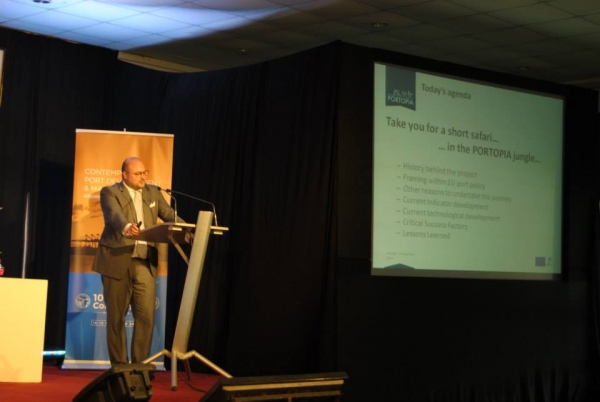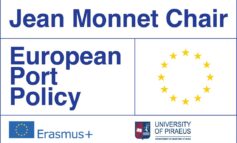Advanced port Performance measurement methods, developed by several PortEconomics members in the context of the PORTOPIA project, have spread their wings to African continent, engaging in discussions with key African ports experts and decision makers.
During a full day pre-conference workshop, the PORTOPIA project and its technological development were presented to statistics, ICT and general management experts of East African ports, all members of the Port Management Association of East and Southern Africa (PMAESA). The workshop was chaired and facilitated by mr. Franklin Mziray, secretary general of the PMAESA.
PortEconomics member Dr. Michaël Dooms, PORTOPIA’s project coordinator, and Mr. Hugo Diogo from Glintt Inov, PORTOPIA’s main technology partner, animated the workshop. During the conference, both Dr. Michaël Dooms on the topic of port industry performance management and Hugo Diogo on competitive intelligence and ICT development in ports took the stage for plenary presentations and ensuing panel discussions, in front of the conference audience of more than 200 participants coming from all corners of the continent. Next to the presentations, a permanent booth in the exhibition area was set up for in-depth demonstrations and discussion with individual stakeholders.
From the different meetings and discussions, it emerged that several synergies are possible, given the similarity of challenges across continents when it comes to the sharing and exchange of key performance figures in view of learning and self-improvement objectives. While the main discussions of the conference revolved around the AIMS 2050 strategy (http://pages.au.int/maritime) as well as potential knowledge transfer from Europe to Africa, the PORTOPIA team also acknowledged state-of-the-art development at the African side regarding port performance management publications and practices, such as Kenya Ports Authority’s (KPA) annual statistics and performance report, and the recently launched Northern Corridor performance dashboard focusing on logistic chain and operational performance indicators (http://kandalakaskazini.go.ke).
PortEconomics members, and their collaborators in the context of the PORTOPIA project, looks forward to explore collaboration and partnerships with African ports, as the first interactions and the enthusiasm shown were very promising. As one of the strategic objectives of the project is to set-up collaborations across the continents, the activities before and during the PAPC conference are to be considered as an important step towards achieving this aim.
You may freely download Michael’s presenatation @PortEconomics.eu.
More about PORTOPIA: PORTOPIA










